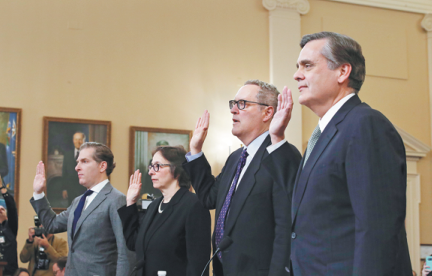Legal experts testify about impeachment
Trump's actions warrant removal from office, three scholars tell hearing
By Ai Heping in New York | CHINA DAILY | Updated: 2019-12-06 10:41

The Democrats-led impeachment process against US President Donald Trump moved from the evidence phase to the prosecution phase on Wednesday as the House of Representatives' Judiciary Committee heard testimony from constitutional law experts about the basis for impeachment.
It was the committee's first impeachment hearing following investigation processes. Its goal is to establish the standards for impeachment to determine whether actions by Trump meet the constitutional threshold for removing a president from office. Democrats are expected to draft articles of impeachment as soon as next week.
The three law professors invited by Democrats who control the committee-Noah Feldman of Harvard University, Pamela Karlan of Stanford University and Michael Gerhardt of the University of North Carolina-agreed that Trump's conduct far exceeded the high crimes and misdemeanors bar set in the Constitution and warrant impeachment and removal from office.
"The president's serious misconduct, including bribery, soliciting a personal favor from a foreign leader in exchange for his exercise of power, and obstructing justice and Congress are worse than the misconduct of any prior president," said Gerhardt, who testified during 1998 impeachment proceedings against former US president Bill Clinton.
"If what we're talking about is not impeachable, then nothing is impeachable. This is precisely the misconduct that the framers created the Constitution, including impeachment, to protect against," he said.
Feldman said that Trump's move to withhold a White House meeting and military assistance from Ukraine while he demanded political favors from its president was a classic impeachable abuse of power.
"If we cannot impeach a president who uses his power for personal advantage, we no longer live in a democracy," he said. "We live in a monarchy or a dictatorship."
Jonathan Turley, a George Washington University law professor, was invited to testify by the committee's Republican members. He said that, although he wasn't a Trump supporter and was critical of the president's actions regarding Ukraine, Trump shouldn't be impeached because the construction of the case against him is dangerously "slipshod" and premature. He argued the case is destined for "collapse in a Senate trial".
"I am concerned about lowering impeachment standards to fit a paucity of evidence and an abundance of anger," Turley said. "If the House proceeds solely on the Ukrainian allegations, this impeachment would stand out among modern impeachments as the shortest proceeding, with the thinnest evidentiary record, and the narrowest grounds ever used to impeach a president."
Turley, who also testified at the Clinton impeachment hearings, said there was no direct evidence to show that Trump withheld nearly $400 million in military aid from Ukraine and a White House meeting with Ukrainian President Volodymyr Zelensky as he pressured Zelensky to pursue Trump's desired investigations of his political rival, Democratic presidential candidate Joe Biden.
Turley agreed with the three other law professors that a quid pro quo to force the investigation of a political rival in exchange for military aid can be impeachable offense. But he argued that the evidence needed to be stronger and that direct testimony was needed from witnesses like Mick Mulvaney, the acting White House chief of staff, and John Bolton, former US national security adviser. Testimony from other witnesses about their actions is not sufficient, he said.
Obstruction of Congress
Turley also disagreed that Trump had engaged in obstruction of Congress by withholding documents and ordering senior officials not to testify before the House Intelligence Committee. He said Democrats should wait for federal courts to resolve whether White House officials must respond to subpoenas from Congress.
The Judiciary Committee' s first impeachment hearing came a day after Democrats on the House Intelligence Committee released a 300-page report accusing Trump of pressuring Ukraine-a nation dependent on US support for its war against Russia-to investigate Democratic challenger Biden and his son Hunter Biden. They also allege that the president obstructed their investigation and intimidated witnesses along the way.
From the opening minutes of the hearing, Republicans repeatedly raised procedural objections. They sought to delay the hearing by a week, to subpoena House Intelligence Committee Chairman Adam Schiff and to subpoena the anonymous whistleblower who first revealed Ukraine allegations.
Judiciary Committee Chairman Jerry Nadler quickly quashed each effort, calling votes along party lines to push them aside.
A White House counsel refused an invitation for Trump and his lawyers to participate, but he didn't rule out the possibility of their taking part in future hearings.
Representative Doug Collins, the top Republican member of the Judiciary Committee, called the impeachment inquiry a "simple railroad job" and that Democrats were basing their case on disputed facts. "We have just a deep-seated hatred of a man who came to the White House and did what he said he was going to do," Collins said.
Collins criticized the three lawyers who testified in support of Trump's impeachment. "You couldn't have possibly actually digested the Adam Schiff report from yesterday, or the Republican response in any real way," he said.























